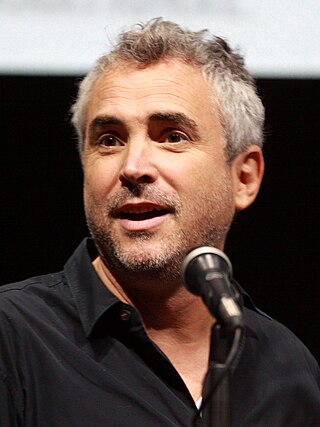
Alfonso Cuarón Orozco is a Mexican filmmaker. He is known for directing films in a variety of genres including the family drama A Little Princess (1995), the romantic drama Great Expectations (1998), the coming of age road film Y tu mamá también (2001), the fantasy film Harry Potter and the Prisoner of Azkaban (2004), the science fiction films Children of Men (2006) and Gravity (2013), the semi-autobiographical drama Roma (2018), and the 2009 short I Am Autism.

Brian Russell De Palma is an American film director and screenwriter. With a career spanning over 50 years, he is best known for his work in the suspense, crime and psychological thriller genres. De Palma was a leading member of the New Hollywood generation of film directors. His direction often makes use of quotations from other films or cinematic styles, and bears the influence of filmmakers such as Alfred Hitchcock and Jean-Luc Godard.

The Informer is a 1935 American drama thriller film directed and produced by John Ford, adapted by Dudley Nichols from the novel of the same title by Irish novelist Liam O'Flaherty. Set in 1922, the plot concerns the underside of the Irish War of Independence and centers on a disgraced Republican man, played by Victor McLaglen, who anonymously informs on his former comrades and spirals into guilt as his treachery becomes known. Heather Angel, Preston Foster, Margot Grahame, Wallace Ford, Una O'Connor and J. M. Kerrigan co-star. The novel had previously been adapted for a British film The Informer (1929).

Red Storm Rising is a war novel, written by Tom Clancy and co-written with Larry Bond, and released on August 7, 1986. Set in the mid-1980s, it features a Third World War between the North Atlantic Treaty Organization and Warsaw Pact forces, and is unique for depicting the conflict as being fought exclusively with conventional weapons, rather than escalating to the use of weapons of mass destruction or nuclear warfare. It is one of two Clancy novels, along with SSN (1996), that are not set in the Ryanverse.
Sarah Zettel is an American author, primarily of science fiction. Her first short story was published in Analog Science Fiction and Fact in 1991. Zettel's novels have won multiple awards, including the Philip K. Dick Award and the Locus Award for Best First Novel, and positive reviews from critics. Her first novel Reclamation was published in 1996 and her second novel Fool's War in 1997. She has written romance novels and mysteries under the pseudonym Darcie Wilde, and the novel Bitter Angels as C. L. Anderson.
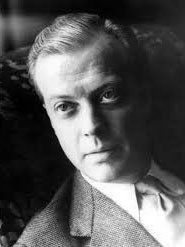
Eric Clifford Ambler OBE was an English author of thrillers, in particular spy novels, who introduced a new realism to the genre. Also working as a screenwriter, Ambler used the pseudonym Eliot Reed for books cowritten with Charles Rodda.
William Haggard was the pseudonym of Richard Henry Michael Clayton, the son of the Rev. Henry James Clayton and Mabel Sarah Clayton. He was an English writer of fictional spy thrillers set in the 1960s through the 1980s, or, as the writer H. R. F. Keating called them, "action novels of international power." Like C. P. Snow, he was a quintessentially British Establishment figure who had been a civil servant in India, and his books vigorously put forth his perhaps idiosyncratic points of view. The principle character in most of his novels is the urbane Colonel Charles Russell of the fictional Security Executive,, who moves easily and gracefully along Snow's Corridors of Power in Whitehall. During the years of the fictional spy mania initially begun by the James Bond stories, Haggard was considered by most critics to be at the very top of the field.

Across the River and Into the Trees is a novel by American writer Ernest Hemingway, published by Charles Scribner's Sons in 1950, after first being serialized in Cosmopolitan magazine earlier that year. The title is derived from the last words of U.S. Civil War Confederate General Thomas J. "Stonewall" Jackson: “Let us cross over the river and rest under the shade of the trees.”
The conspiracy thriller is a subgenre of thriller fiction. The protagonists of conspiracy thrillers are often journalists or amateur investigators who find themselves pulling on a small thread which unravels a vast conspiracy that ultimately goes "all the way to the top." The complexities of historical fact are recast as a morality play in which bad people cause bad events, and good people identify and defeat them. Conspiracies are often played out as "man-in-peril" stories, or yield quest narratives similar to those found in whodunits and detective stories.
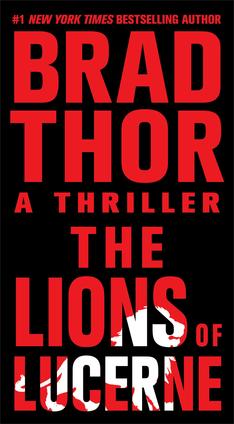
The Lions of Lucerne is a 2002 spy novel by Brad Thor.

Ron Terpening is an American writer, professor of Italian, and editor. Though he started his writing career as an author of young-adult fiction, where the father/son conflict is a major theme, he is best known for his later novels of suspense, most of which are set, at least in part, in Italy, reflecting his academic background as a scholar of Italian culture. His thriller League of Shadows, for example, deals with the Fascist Era in Italy and its aftermath in the contemporary world. A later international thriller, Nine Days in October, came out of the author's course research on the forces of order and disorder in contemporary Italy and follows a band of criminals and ex-terrorists as they attempt to carry out an assassination plot. All of his novels, including Storm Track and Tropic of Fear, the latter set in Paraguay, are noted for their strong sense of place. In most of his novels, his protagonist is usually a common man placed in a situation where powerful forces are arrayed against him.
Kira Lily Peikoff is a journalist and novelist, based in New York City.
Anthony Hyde is a Canadian author of spy novels, most notably The Red Fox and Formosa Straits.

Uncommon Danger is the second novel by British thriller writer Eric Ambler, published in 1937. It was published in the United States as Background To Danger. In his autobiography, Here Lies Eric Ambler, Ambler explains that "Background To Danger" was the original title, but his British publisher disliked the word 'background', so it was published in all English-speaking countries except the US as Uncommon Danger.
Gregory Dowling is an author, translator, literary critic and Professor of Anglo-American Literature at the Università Ca’ Foscari in Venice.
Slow Burner is a 1958 suspense novel by the British author William Haggard published in England by Cassell and in the United States by Little Brown. It was Haggard's first novel and the first of many involving his protagonist Colonel Charles Russell, the head of the urbane unobtrusive but lethal Security Executive, a government counter-intelligence agency clearly based on the actual MI5 or Security Service, who moves easily and gracefully along C.P. Snow's Corridors of Power in Whitehall. Like most of the other works by Haggard and some by his near contemporaries Victor Canning and Michael Gilbert, it is both a standard novel of suspense and a semi-political thriller about the reactions of those in high government positions who scent potential danger to their own political standing from the on-going events of the novel.

The Arena is a 1961 suspense novel by the British author William Haggard published in England by Cassell and in the United States by Washburn. It was Haggard's third of 21 books involving his urbane protagonist Colonel Charles Russell, the head of the unobtrusive but lethal Security Executive, a government counter-intelligence agency clearly based on the actual MI5 or Security Service, where he moves easily and gracefully along C.P. Snow's Corridors of Power in Whitehall. Like all of the other works by Haggard it is a standard novel of suspense, but combined, as usual with Haggard, with other elements: the reactions of those in high government positions who fear non-political events that could endanger Britain's place in the world, along with a tough-minded, even cynical depiction of financial shenanigans in the City of London. And like Venetian Blind, Haggard's previous book, it is very much a novel of character, albeit a bleak one.
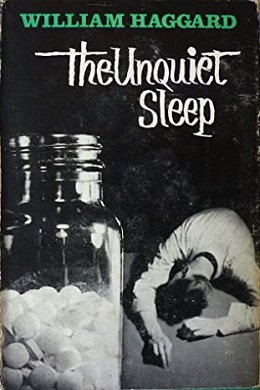
The Unquiet Sleep is a 1962 suspense novel by British author William Haggard which was published in England by Cassell and in the United States by Ives Washburn. It is the 4th novel in a series of 21 books that involve urbane protagonist, Colonel Charles Russell. Russel is the head of the Security Executive, a government counterintelligence agency based on the actual MI5 or Security Service. He moves easily and gracefully along C.P. Snow's Corridors of Power in Whitehall. As in Haggard's earlier books, it has the standard elements of a suspense thriller along with detailed examinations of character, but with more scenes of direct action and somewhat less dissection of character and motivation from the first three books.

The Antagonists is a 1964 suspense novel by the British author William Haggard published in England by Cassell and in the United States by Ives Washburn. It was Haggard's sixth of 21 books involving his protagonist Colonel Charles Russell, the urbane head of the unobtrusive but lethal Security Executive, a government counter-intelligence agency clearly based on the actual MI5 or Security Service, where he moves easily and gracefully along C.P. Snow's Corridors of Power in Whitehall. Like Haggard's earlier books it has standard elements of suspense thrillers along with detailed examinations of character, but in this case with more scenes of direct action and somewhat less dissection of character and motivation than in the first three books.
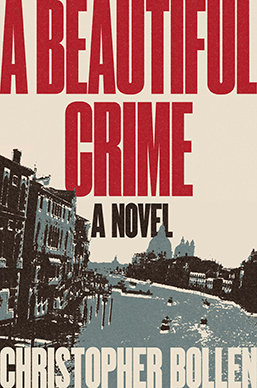
A Beautiful Crime is a 2020 crime fiction novel by the American writer and editor Christopher Bollen. It is Bollen's fourth novel and was written in 2018 during a residency in Paris. The novel was first published in the United States by Harper on January 28, 2020.













